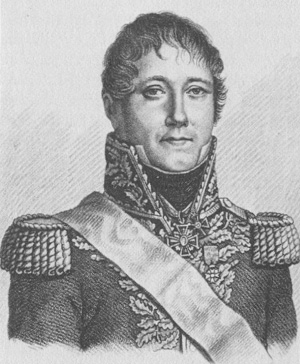General Jean Gabriel Marchand

Born: December 10, 1765
Place of Birth: Albenc, Isère, France
Died: November 12, 1851
Place of Death: Saint-Ismier, France
Arc de Triomphe: MARCHAND on the south pillar
Pronunciation:
Originally a lawyer in the Parlement of Grenoble before the French Revolution, Jean Gabriel Marchand volunteered and became a capitaine in the 4th Battalion of Volunteers of Isère in November of 1791. He was sent to serve with the Army of Italy where he would remain until December of 1799. In 1795 Marchand fought at Petit-Gibraltar and then Loano, and after the latter battle he was promoted to chef de bataillon by General Schérer. After General Napoleon Bonaparte took command of the Army of Italy in March of 1796, Marchand served at the action of Cossaria in April of 1796. That July he was serving under Joubert in Masséna's division at the combat of Bochetta-di-Campion. Later that month Marchand was wounded when he took a shot to the chest defending his post. He went on to fight at Brenta, Saint-Martin, and Caldiero before being taken prisoner at Madona della Corona in November. Fifteen days later he was released on a prisoner exchange and then he was promoted to chef de brigade. In October of 1797 Marchand was named chef de brigade of the 11th of the Line and then in 1798 he was appointed commander of Rome under Gouvion St. Cyr. He became an aide-de-camp to Joubert in September of that year and then in 1799 he was next to Joubert when Joubert was hit and killed at the Battle of Novi . In October of 1799 Marchand received a promotion to général de brigade and then in December he joined the Army of the Rhine.
After serving in some administrative positions, in late 1803 Marchand took command of the 2nd Brigade of Dupont's division in the camp of Montreuil, which in 1805 became Marshal Ney's VI Corps. During the campaign of 1805 Marchand distinguished himself at Haslach, Albeck, and Dürenstein , and he received a promotion to général de division in December. The next year he replaced Loison in command of the 1st Division in VI Corps and with this division he fought at Jena, took part in the siege of Magdeburg, and fought at Soldau. In 1807 he fought at Depen and led his division into action at the Battle of Friedland. A month later he was awarded the Grand Eagle of the Legion of Honor.
Made a Count of the Empire in 1808, Marchand then became the interim commander of VI Corps while Ney was gone and he led the corps to Mainz. VI Corps was then sent to Spain and after it arrived there Marchand took command of the 1st Division and he fought at Mayorga. After taking part in the pursuit of the British Army under General Moore, Marchand was victorious at Puebla de la Tribe. In mid-1809 he took command of VI Corps again and he was beaten at Tamamès and then in December he resumed command of his division. In 1810 he took part in the sieges of Ciudad Rodrigo and Almeida and then he served at Bussaco . The next year he served at Redinha, Chao de Lamas, and Fuentes de Oñoro before returning to France.
In March of 1812 General Marchand was appointed chief of staff of the right wing of the Grande Armée under Jérôme Bonaparte. Napoleon had appointed the experienced Marchand to this position in the hopes that he could guide the much less experienced Jérôme. After Jérôme abandoned the army in July, Marchand took command of the 25th Wurtemberg Division of Ney's III Corps, and he led them into battle at Smolensk , Valutina, and Borodino. After defending Kowno in December, he temporarily took command of IV Corps from Prince Eugene de Beauharnais.
In March of 1813 Marchand took command of the 39th Infantry Division under Ney and he served with them at Wiessenfels, Lützen, and Bautzen. Detached to XI Corps in August, he served under Macdonald and later he took part in the Battle of Leipzig . The start of 1814 saw Marchand commanding the draft in Isère and the 7th military division at Grenoble. After being victorious at Echelles, he drove the Austrians out of Chambéry, but then was forced to evacuate the fort of Ecluse and he fell back into Grenoble.
After Napoleon's abdication in April of 1814, the restored Bourbons left Marchand in charge of the military division at Grenoble. With Napoleon's return from Elba in March of 1815, Marchand tried unsuccessfully to stop Napoleon at Grenoble. When that failed, he retired to the country until Napoleon's second abdication, when he rejoined the army. Marchand briefly served as Minister of War from June 29th to July 8th in the aftermath of Napoleon's second abdication. The next year the Bourbons brought him to trial for abandoning Grenoble to Napoleon, but he was acquitted of all charges. Marchand officially retired from the army in 1825 and in 1837 he was named a Peer of France.
Bibliography
- Haythornthwaite, Philip J. Who Was Who in the Napoleonic Wars. London: Arms & Armour, 1998.
- Six, Georges. Dictionnaire Biographique des Généraux & Amiraux Français de la Révolution et de l'Empire (1792-1814). 2 vols. Paris: Gaston Saffroy, 2003.
Updated April 2023
© Nathan D. Jensen